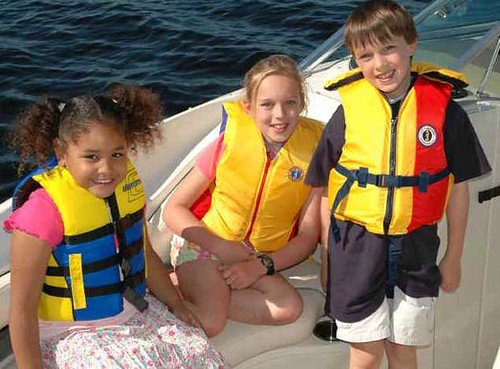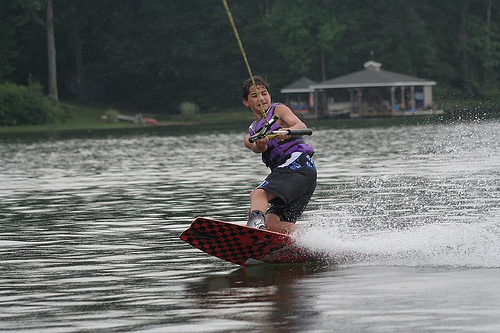
Ten watersports safety tips to help keep you safe this Summer:
With the spring and summer season upon us, it’s a good time for a refresher course on the importance of staying safe when you’re out on the water. The Center for Disease Control and Prevention found that in 2008, there were 4,292 deaths caused either by drowning or recreational boating incidents, an average of nearly 12 per day.
Whether you’re swimming, boating, fishing or waterskiing, keeping safety uppermost in your mind can help prevent a needless tragedy from happening to you or your loved ones this summer.
1. Learn how to swim.
The first and most important thing you can do is learn to swim. Virtually any community center or local Red Cross offers swimming lessons for children and adults at reasonable prices. The sooner children learn to swim and be comfortable in the water, the easier and more natural it will be for them.
2. Always wear a life jacket.
Regardless of your swimming ability, make sure that you always wear a lifejacket, personal flotation device, wetsuit or other appropriate gear. A full 90% of boaters who drowned in 2008 were not wearing lifejackets. Even if you’re a great swimmer, you could be knocked unconscious, exhausted by the currents or overcome by the elements. Wearing a lifejacket not only keeps you afloat, but makes you more visible to rescuers in the event of an accident.

3. Never go out on the water alone.
Make sure you have someone with you at all times whether you’re swimming, boating or fishing. Make sure that friends or family on shore know where you’re going on the water and for how long. This will help them know where to look for you if you’re gone longer than expected.
4. Make sure you have the proper equipment.
Regardless of the water vehicle you’re using, be sure to carry extra equipment. For example, extra lifejackets, flares, a whistle, and ship to shore radio can all come in handy in an emergency. Carry extra maintenance equipment as well, such as a repair kit and fire extinguisher. Make sure you have a first aid kit with you at all times. Store these items safely, and make sure everyone on the boat knows where they are and how to reach them.
If you are out on a boat, have a good GPS navigator system on board. Even if it is a portable handheld GPS unit, it will help to provide valuable information, such as directions, currents, water depth, buoys, and obstacles in the water. If an emergency does occur, you can quickly determine the fastest way back to shore.
5. Know the correct way to use and store your equipment.
Make sure that everyone in your party knows the proper use and storage of recreational equipment such as water skis, wakeboards, Airhead towable tubes and the like. Be sure the equipment is stored safely and securely on your vehicle prior to use.

6. Take your time and do your homework.
Whatever sport you’re enjoying on the water, make sure that everyone is comfortable with the sport and certified if necessary. Be sure to go at the pace of the least comfortable person in your group. Define any hand signals you plan to use ahead of time and check that everyone is familiar with them.
7. Watch out for the children.
Children under 16 should be supervised by an adult at all times when on or around the water. Drowning is the second leading cause of death for children between the ages of 1 and 14. Children can get into trouble very quickly and generally are not as strong swimmers as adults, nor are they as likely to anticipate dangerous situations.
Even if they are just playing on the beach, it’s a good idea for them to wear life jackets in case they wander into the water and get into trouble. Have one or more adults designated as a “spotter” keeping an eye on everyone in the water and give them a whistle or means to quickly call for assistance if necessary. All adults should be aware of basic first aid and CPR techniques.
8. Keep an eye on the weather.
Check the weather conditions regularly and make sure that they are stable. Storms or other weather events can materialize quickly on the water and you need to be able to give yourself enough time to get to safety should the need arise. Avoid rough water whenever possible as currents can often be stronger than expected.
9. Protect yourself from the sun.
Be aware of the sun and protect yourself and your children appropriately. On a warm summer’s day, it’s easy to lose track of how long you’re out in the sun, only to suffer the consequences later. Current studies show that sunscreen is most effective when applied approximately 30 minutes prior to exposure to the sun and then reapplied 20-30 minutes following initial exposure. Sunscreen should then be reapplied every 2-3 hours for the remainder of the time you are out in the sun. Keep extra sunglasses on hand to help protect your eyes.
10. Avoid alcohol.
Finally, avoid alcohol when you’re out on the water. Alcohol impairs your judgement, which can be critical in dangerous situations. Impaired boating is every bit as serious and potentially fatal as impaired driving. It’s important to keep in mind that the effects of alcohol are heightened by exposure to heat and sunlight. Studies show that alcohol use is a factor in up to half of all adult and adolescent deaths in recreational water activities. Stay safe and enjoy your alcohol away from the water.
By making safety your first priority, you can minimize the potential for accidents and instil good habits in your children and friends that will help keep them safe for a lifetime. Have fun and enjoy a great summer on the water!
About the Author
Jane Warren is the publisher of www.towabletubesdirect.com She is an outdoor water sport enthusiast who enjoys swimming and scuba diving. Jane is also an avid boater, and has a great time on the water with boats, water skis and kwik tek towables.
A resident of Atlanta, Georgia, Jane and her husband Jim also spend several months a year at the beach, soaking up the sunshine, and spending time on the water. They enjoy traveling with friends and family, especially to seaside communities.







